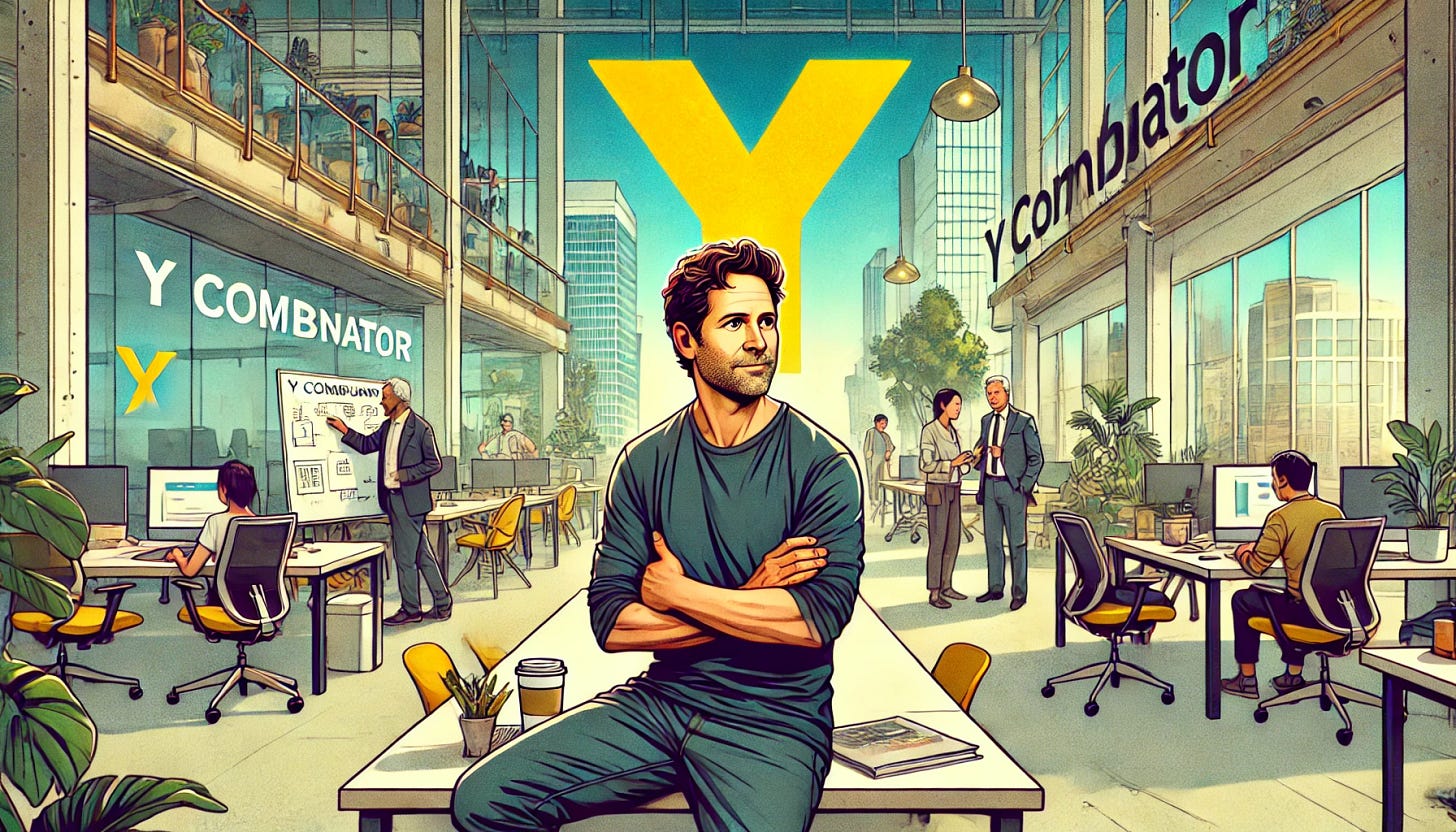Like having a child, running a startup is the sort of experience that's hard to imagine unless you've done it yourself -Paul GrahamBuilding a startup is an exhilarating yet daunting endeavor. The entrepreneurial journey is filled with uncertainty, risk, and countless obstacles. Yet, some have managed to build thriving companies that not only disrupt industries but also stand the test of time. One of the most influential voices in the startup world is Paul Graham, co-founder of Y Combinator (YC), the most prestigious startup accelerator in the world.
Since its founding in 2005, Y Combinator has launched thousands of startups, including unicorns like Airbnb, Dropbox, Stripe, and Reddit. The wisdom and philosophy behind YC’s methodology, largely shaped by Paul Graham’s essays and YC’s principles, offer valuable lessons for aspiring entrepreneurs.
This article will dive deep into Paul Graham’s insights and Y Combinator’s proven strategies for building successful startups. From the importance of finding product-market fit to the nuances of startup growth, fundraising, and scaling, we'll explore key elements that any founder should consider when embarking on their entrepreneurial journey.
Why learn from them? The answer is simple. Because Paul Graham and Y Combinator have experience in giving birth to large startups through their acceleration programs.
1. Start with a Problem, Not a Solution
One of Paul Graham’s fundamental beliefs is that successful startups are built by solving real problems. Many first-time founders make the mistake of focusing on a solution or an idea without fully understanding whether the problem they’re solving is significant enough.
In his famous essay, "How to Start a Startup," Graham emphasizes the importance of starting with the problem:
"The very best startup ideas tend to have three things in common: they’re something the founders themselves want, that they themselves can build, and that few others realize are worth doing."
This perspective is key: startups must address a problem that is important and meaningful enough to drive real change. This is often referred to as problem-market fit — the process of identifying a real-world problem and finding a viable solution that addresses it effectively.
Examples from YC’s Portfolio
Many of YC’s most successful startups were born from personal problems experienced by the founders. For instance:
Dropbox was founded because Drew Houston was frustrated with carrying USB drives and email attachments between computers.
Airbnb began as a way for the founders, Brian Chesky and Joe Gebbia, to pay rent by renting out air mattresses in their apartment when a design conference led to a shortage of available accommodations in San Francisco.
In both cases, the founders were deeply familiar with the problem they were solving. This gave them the motivation and insight to build products that resonated with a large number of users.
2. Find Your Co-founder and Build a Strong Team
Building a startup is rarely a solo endeavor. One of the most crucial decisions an entrepreneur can make is choosing a co-founder. Paul Graham often stresses the importance of having a team that can not only execute on the idea but also support each other during the ups and downs of the startup journey.
"You need two things to create a successful startup: to start with good people, and to make something customers want."
Graham believes that the combination of complementary skills, shared vision, and a strong working relationship is the key to long-term success. A common mistake is choosing a co-founder for the wrong reasons, such as friendship without complementary skills or experience. The best co-founding teams are often made up of people with different but complementary skill sets — such as one technical founder and one business-oriented founder.
Characteristics of a Great Startup Team
YC looks for the following qualities in a founding team:
Technical Excellence: Founders should have the ability to build the product themselves, or at least one member of the team should be able to code, design, or develop the product. This allows for rapid prototyping and iteration, which is crucial in the early stages.
Grit and Resilience: Founders should be prepared to navigate the inevitable obstacles that come with building a startup. Determination, resourcefulness, and an ability to stay focused are essential qualities.
Communication and Trust: Effective communication and mutual trust between founders are crucial. Many startups fail not because the idea was bad, but because of internal team conflict.
YC’s Role in Shaping Strong Teams
Y Combinator has helped many startups by encouraging founders to team up with people who are not just smart and skilled but who also share the same commitment to the mission. The program emphasizes the importance of trust and communication, helping founders navigate early-stage team dynamics.
3. Launch Early and Iterate
One of Paul Graham’s core teachings is the value of launching early and continuously iterating. YC encourages startups to launch a minimum viable product (MVP) quickly, even if it’s imperfect, to get real feedback from users. This approach aligns with the "lean startup" methodology that focuses on validating ideas through customer feedback rather than building a fully polished product that may not meet market needs.
"The most important thing is to get something out there and then iterate. It’s OK to launch when it’s not perfect, but it’s not OK to launch when it doesn’t solve any real problem."
Advantages of Launching Early
Learning from Customers: Early feedback from users is crucial in refining your product. You learn what features are important, what problems need to be solved, and how users interact with your solution.
Building Momentum: Launching early gives you the opportunity to start building a user base, which can be valuable when you’re seeking investment or media attention.
Staying Ahead of Competitors: The startup landscape is competitive, and waiting too long to launch could result in someone else solving the same problem. Launching early allows you to test your solution in the real world and make necessary adjustments before competitors enter the space.
The YC Approach to Iteration
Y Combinator fosters a culture of iterative development. The three-month accelerator program is intense, with founders required to show consistent progress. Startups are expected to continuously refine their products based on user feedback, enabling them to build solutions that truly meet market demand by the time they present at Demo Day.
4. Focus on Growth and Product-Market Fit
One of the key metrics YC emphasizes is growth. Successful startups grow quickly by finding and delivering real value to their users. Paul Graham argues that the primary goal of early-stage startups is to find product-market fit — a situation where your product satisfies the needs of a specific market segment so well that customers are willing to pay for it, and your user base grows organically.
"You have to make something that people want so much that they grow dependent on it. The measure of this is whether they’d be genuinely disappointed if you went away."
What Is Product-Market Fit?
Product-market fit occurs when your product meets the needs of your market so well that demand increases naturally, resulting in strong word-of-mouth, user engagement, and retention. It’s the phase when the startup stops struggling to acquire users and starts growing consistently because the market is pulling the product.
Metrics to Gauge Product-Market Fit
YC advises startups to focus on specific metrics that signal product-market fit:
Retention Rate: If users keep coming back to use your product, it’s a good indicator that it solves a real problem.
User Growth: Once you find product-market fit, your user base should grow organically, with users recommending your product to others.
Customer Feedback: Positive feedback from customers, especially when they express dissatisfaction if the product is taken away, is a strong signal of product-market fit.
YC’s Philosophy on Growth
Growth is a core focus during Y Combinator’s accelerator program. Founders are taught to measure and optimize key metrics, and they are expected to report on growth every week. This emphasis on metrics ensures that founders stay focused on their most critical goal: building something that users love.
5. Fundraising: Timing and Strategy
Fundraising is one of the most challenging aspects of building a startup, and Y Combinator has helped founders navigate this complex process by offering hands-on mentorship and access to a network of investors. Paul Graham advises startups to be cautious and strategic when it comes to raising money.
"Raising money should be a means to an end, not an end in itself. Startups should focus on building a good product first, and the money will follow."
When to Raise Money
Founders should only raise money when they have achieved enough traction or product-market fit to justify investment. YC encourages startups to use their funding strategically, and only after they’ve validated their core assumptions and demonstrated early growth.
Pre-seed or Seed Round: Typically, this is the first round of funding, where founders raise enough capital to develop the product, prove their idea, and achieve early traction.
Series A and Beyond: Series A is usually raised after a startup has demonstrated product-market fit and needs capital to scale. At this stage, metrics like revenue, growth, and user retention become critical for attracting larger investors.
YC Demo Day and Investor Relations
One of Y Combinator’s most impactful contributions to the startup world is Demo Day. This is the event at the end of the accelerator program where startups present their progress to a room full of investors. YC’s Demo Day has become one of the most prestigious events in Silicon Valley, often resulting in substantial funding for many startups.
YC also places a strong emphasis on investor relations. Founders are taught to be judicious with their equity and not to raise more money than they need at the early stage, as dilution can become a major problem as startups scale.
6. Be Persistent, but Be Ready to Pivot
Paul Graham emphasizes the importance of persistence in the startup world, but he also advocates for the ability to pivot when necessary. Startups often need to change direction, either because their original idea didn’t resonate with the market or because they discovered a more promising opportunity.
"One of the things that distinguishes successful founders is persistence. Successful startups almost always take longer than expected. But that doesn’t mean you shouldn’t change direction when it’s clear that things aren’t working."
Knowing When to Pivot
A pivot is a shift in the core focus of your business. It might involve changing your product, target market, or business model. YC encourages founders to listen to their users and market signals, and to pivot when it becomes clear that the current direction is not sustainable.
Customer Feedback: If users aren’t responding positively to your product, or if they’re using it in a way you didn’t expect, it might be time to reconsider your approach.
Slow Growth: If your startup isn’t growing at the expected rate and you’ve tried all reasonable optimizations, it might be time to explore a pivot.
Examples of Successful Pivots
Some of the most successful YC startups began with different ideas and pivoted:
Airbnb originally started as a service for renting air mattresses during events but pivoted to become a full-scale platform for short-term lodging.
Instagram began as a location-based social network called Burbn but pivoted to focus on photo-sharing, leading to massive growth.
7. Create a Scalable and Sustainable Business Model
While growth is important, it must be supported by a business model that is both scalable and sustainable. Paul Graham advises founders to start thinking about their revenue model early on, even if it’s not fully implemented from the beginning.
"It's OK to start with a free product to build a user base, but at some point, you'll need to figure out how to make money. Ideally, you want a model that scales with the number of users."
Key Considerations for a Scalable Business Model
Low Marginal Costs: A business model where the cost of serving each additional customer is low is essential for scaling. This is why many software startups, with near-zero marginal costs, are highly scalable.
Subscription Models: Subscription-based businesses tend to have predictable, recurring revenue, making them more attractive to investors. Examples include SaaS companies like Dropbox and Stripe.
Marketplace Models: Marketplaces, such as Airbnb and Uber, scale by connecting buyers and sellers and taking a commission on each transaction. These businesses can grow rapidly as they add more participants to the platform.
YC teaches startups to focus on building sustainable revenue streams early on. While some startups, like Twitter and Facebook, focused on user growth before monetizing, others implement revenue models from the beginning.
8. Building a Strong Company Culture
As startups scale, one of the biggest challenges is maintaining a strong and cohesive company culture. According to Paul Graham, company culture is often an overlooked but essential aspect of long-term success.
"Your culture is the way people behave when no one is watching. It's what shapes the decisions and actions of your team as you grow."
The Importance of Culture in Startups
Startups need to create a culture that aligns with their values and mission. In YC’s experience, companies that build strong cultures are better able to retain talent, navigate crises, and stay focused on their goals.
Transparency: Open communication and transparency can help maintain trust within the team, particularly during times of uncertainty.
Meritocracy: YC promotes a merit-based culture where the best ideas win, regardless of who proposes them.
Customer-Centricity: A culture that prioritizes the needs of the customer ensures that the startup remains focused on solving real problems.
YC’s Role in Shaping Culture
Y Combinator encourages startups to think about culture from day one. During the program, founders are advised on how to scale their teams while maintaining the values that initially drove their success. Founders are also encouraged to hire slowly and fire quickly if necessary, as a few bad hires can damage the company’s culture.
Conclusion
Building a successful startup is a complex and challenging journey, but the lessons from Paul Graham and Y Combinator provide a roadmap that can help guide founders through the process. From focusing on solving real problems to building a strong team, launching early, and iterating based on user feedback, these insights have helped launch some of the world’s most successful startups.
Key takeaways include:
Start with a problem, not a solution.
Build a strong co-founding team with complementary skills.
Launch early, iterate often, and prioritize user feedback.
Focus on growth, product-market fit, and building a scalable business model.
Raise money strategically and maintain control over your company.
Be persistent, but be ready to pivot when necessary.
Build a strong company culture that aligns with your mission.
By following these principles and staying adaptable, founders can increase their chances of building a startup that not only survives but thrives in an increasingly competitive and fast-paced world. Y Combinator’s success stories stand as proof that these strategies work, and with the right mindset, any startup can aspire to join the ranks of YC’s alumni.





